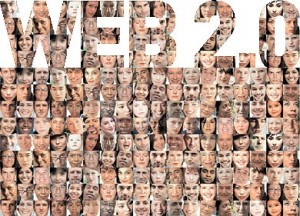 For my ETEC511 course I was asked to define Web 2.0:
For my ETEC511 course I was asked to define Web 2.0:
Web 2.0 describes the second layer of Internet computing where users collaborate online to add and share content. Now the web is a much more social area where users are creators and publishers of content, resulting in a “collective intelligence”.
Websites are no longer static places of information that readers consume. Now sites are dynamic and interactive, incorporating web applications to engage users. Main features of Web 2.0 are:
1.Using online technology to make connections between users, business teams and software applications.
2.Users easily add or access digital media.
3.Component services can be put together to create integrated online content.
As a result:
1.Information is being produced at massive rates.
2.Communication has become open.
3.Webmasters now share responsibility with users to ensure quality and relevancy of information.
4.Economic models of the web have changed.
The first phase of the Internet is considered Web 1.0. This was an electronic version of traditional publishing, where one entity published material and one entity consumed it. The electronic format made it easier to self publish so not only large companies were producing material. In this model the site moderator was responsible for ensuring the site was updated and contained quality information. Also, the business strategy adopted during this phase of the Internet was to build an attractive website and hope people would view it. This phase of the Internet reached its peak with the dot com bubble of the 90`s, after which people were searching for new ideas for using the web, hence the formation of ideas that eventually led to what we now know as Web 2.0.
The term was first popularized around October 2004. At this time O`Reily Media and Media Live International held a series web development conferences called Web 2.0. The name stuck and transformed to become a catch all phrase for what some saw as a web renaissance of creative uses for the Internet. Web 2.0 changes how companies approach business on the web and this impacts users. Most users tend to inhabit certain sites such as Facebook, You Tube, etc. As a result businesses must attach their name to sites like these to promote their brand. Also, the purchase of standalone software should decrease as free online software increases in popularity. Web 2.0 has resulted in a business model where 99% of users are offered free access to basic Internet based software and 1% of specialized users are charged to use advanced features.
Three basic innovations in computing facilitated the shift to a Web 2.0 model:
1.Rich Internet Applications – browsing experience now similar to a desktop.
2.Service Oriented Applications – other applications integrate these into their functionality.
3.Increased Social Applications – allows users give feedback, content, etc.
Examples of Web 2.0 include Facebook, Delicious, Podcasts, RSS feeds, Flickr, Blogs, You Tube, Wikis, Google Maps, Digg and Technolchrati.
Further Reading:
http://oreilly.com/web2/archive/what-is-web-20.html
http://www.explainingcomputers.com/web2.html


 For my ETEC511 course I was asked to define Web 2.0:
For my ETEC511 course I was asked to define Web 2.0: There is no question that the Internet has radically transformed how we work and play, but
There is no question that the Internet has radically transformed how we work and play, but